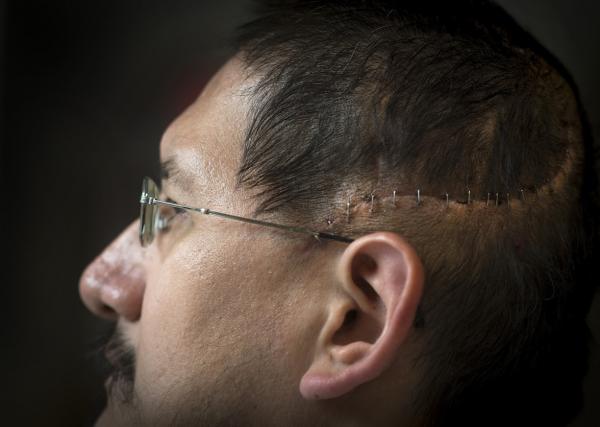David Warner was not expected to survive.
The culture, gender and race studies professor at Washington State University suffered a traumatic brain injury March 30, 2013, when he was assaulted outside a bar near the Pullman, Washington, campus. Warner, 42, doesn’t remember trying to prevent a verbal confrontation close to 2 a.m. that day or being tackled to the ground and striking his head against the asphalt.
Warner, whose heritage comes from Canada’s First Nations, was transported by helicopter from Pullman to Spokane, a distance of about 75 miles. Surgeons discovered that Warner’s skull had cracked into three pieces and his brain was swelling. They removed a four-by-six-inch piece of his skull to manage the pressure.
“My skull shattered on impact,” Warner said during a phone interview this month. “They didn’t expect me to survive.”
RELATED: Assaulted Native Professor Awake After More Than a Week in ICU
Warner doesn’t remember the two weeks he was in critical condition at Providence Sacred Heart Medical Center, or the following two weeks at a separate facility for serious head trauma. He remembers waking up at St. Luke’s Rehabilitation Institute and struggling to put words together.
“I lost about a month and a half,” he said. “My vocabulary was reduced to five words. I couldn’t think. I couldn’t come up with words except the five that were in my vocabulary.”
The situation was a new one for Warner, who earned his PhD in American Studies in August of 2012 and was teaching courses in gender and race. Before the injury, he was characterized as a prolific reader, writer and poet, said his mother, Cherie Warner.
“He was a voracious reader his whole life,” Cherie said of her son. “He would go through books and remember them. He has a library that would rival the town’s library.”

David Warner is seen here before the assault. (Courtesy Warner family)
Warner always wanted to be a teacher, his mother said. He earned a bachelor’s degree in psychology and a master’s degree in American Studies at Washington State University. When the university offered him a teaching position, he jumped at the opportunity to teach classes about gender and race and to research topics like tribal sovereignty, self-determination, genocide studies and critical race theory.
“He’s very passionate about that subject area and the marginalization of minority people,” Cherie said. “He has a lot of knowledge in that. He knows and understands it.”
Warner’s life changed when his head hit the ground. During the weeks in the rehabilitation hospital, speech and physical therapists worked every day to help him relearn skills that at one point were second nature. He returned home at the end of May, still facing a long road to recovery.
A year after the injury, Warner is able to live alone and take care of himself, his mother said. He goes to conferences with colleagues and attends classes at the university. Some of the lingering effects include problems remembering names and difficulty with reading and comprehension.
“I can read books and understand words,” Warner said. “Before, I could read a book and remember all of it. I’m not retaining it now. I can’t recall the words and get the message. At the present time, my brain needs to heal some more.”
As Warner was in initial stages of recovery, Pullman police arrested five people who were connected with the assault. According to the police report, Warner was drinking with a friend that night at a bar called Stubblefields. Just before 2 a.m., Warner’s friend confronted a group of people and began insulting them.
Surveillance footage shows Warner trying to prevent the confrontation from getting physical. He stretched out his arms between the parties as his friend advanced and threw a punch. Warner and his friend were tackled, but cars obstruct the video and it is unclear whether Warner was injured when he hit the ground or if one of the assailants kicked him in the head.

Because the video surveillance was inconclusive, prosecutors ultimately dropped the charges, said Bill Gilbert, an attorney representing Warner in a civil suit. Gilbert is in the process of investigating the incident. He may file civil claims against the people involved in the assault or against the bar and seek damages topping $250,000 to cover medical bills and expenses.
“It was a drunken, stupid episode,” Gilbert said of the incident. “The value in this case, you can’t put numbers on it. You’ve got a guy who’s brilliant, who has a PhD, who’s going to be messed up for life.”
Warner believes that, in time, he will heal and once again teach at Washington State University.
“There’s a quote I give my students,” he said. “I tell them I constantly think about hope. It makes me stronger and filled with life.”
Read more at http://indiancountrytodaymedianetwork.com/2014/03/18/one-year-later-assaulted-native-professor-continues-healing-and-hoping-154062?page=0%2C2

